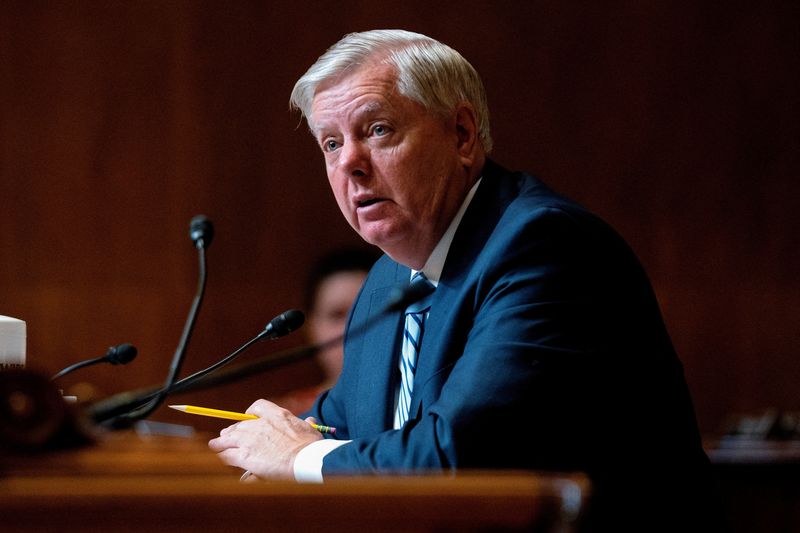U.S. Supreme Court allows Graham questioning in Georgia election probe
2022.11.01 15:06
[ad_1]

© Reuters. FILE PHOTO: U.S. Senator Lindsey Graham (R-SC) asks questions to Attorney General Merrick Garland during a Senate Appropriations Subcommittee on Commerce, Justice, Science, and Related Agencies hearing to discuss the fiscal year 2023 budget of the Departm
By Andrew Chung
WASHINGTON (Reuters) -The U.S. Supreme Court on Tuesday declined to block Senator Lindsey Graham from having to testify before a grand jury in a criminal investigation of Donald Trump’s efforts to overturn his 2020 election loss in the state of Georgia, handing a setback to a prominent ally of the former president.
The justices denied Graham’s emergency request to put on hold a judge’s order requiring him to appear as a witness before the grand jury in Fulton County while the Republican senator’s appeal in the dispute proceeded. Graham, who represents South Carolina in the Senate, contends that as a member of Congress he is protected under the U.S. Constitution from questioning in the investigation.
There were no publicly noted dissents to the decision. The unsigned order said that the lower courts assumed that Graham, as a sitting senator, was immune from questioning under the Constitution’s so-called Speech or Debate Clause for any fact-finding efforts in which he engaged and that he may legally contest any disputes arising from specific questions.
“Accordingly, a stay or injunction is not necessary to safeguard the Senator’s Speech or Debate Clause immunity,” the order said.
Justice Clarence Thomas on Oct. 24 temporarily blocked Graham’s testimony pending a decision by the full court on how to proceed. Graham had appealed to the Supreme Court after the Atlanta-based 11th U.S. Circuit Court of Appeals on Oct. 20 unanimously rebuffed his attempt to avoid testifying as ordered by a judge while the litigation proceeds.
Graham is not a target in the investigation but has been subpoenaed to testify before the special grand jury, which was formed as part of the investigation led by Fulton County District Attorney, a Democrat, into possible coordinated attempts to illegally interfere in the outcome of the 2020 election.
In Georgia, a special grand jury cannot return indictments but can recommend criminal prosecution related to its investigation.
Prosecutors sought Graham’s testimony about phone calls he made to Georgia election officials in the weeks after Trump lost the election to Democrat Joe Biden. Graham during the calls questioned the officials – fellow Republicans – “about re-examining certain absentee ballots in order to explore the possibility of more favorable outcome for former President Donald Trump,” prosecutors said in court documents.
[ad_2]
Source link








